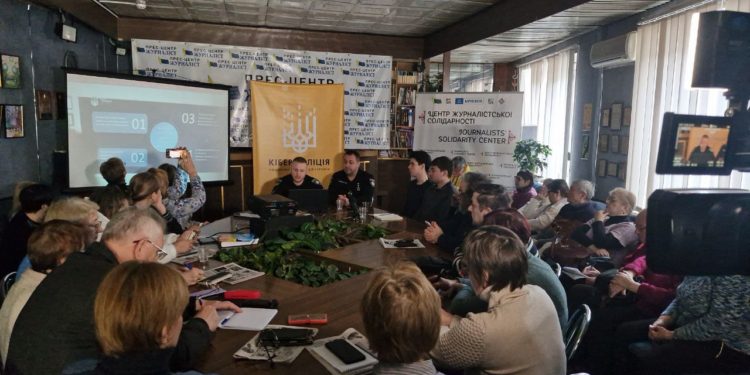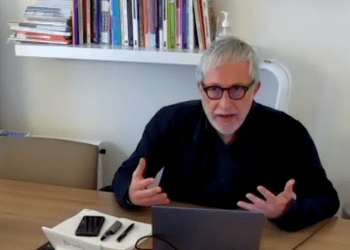In conditions of war, cybersecurity has become no less important than physical security. Every day, Ukrainians face fraudulent schemes, phishing attacks, account hacking, and information sabotage by russian propagandists. How to protect yourself from these threats, what to do if your account is hacked, and how every citizen can help clean up Ukraine’s information space – all this was told to media workers by cyber police representatives during a training at the Zaporizhzhia Journalists’ Solidarity Center (JSC) of the National Union of Journalists of Ukraine (NUJU).
The main methods used by scammers in cyberspace:
- Phishing – fake sites that imitate well-known resources and lure users into giving up personal data.
- Social engineering – messages supposedly from friends, banks, or companies that convince you to disclose confidential information.
- Fraud through messengers – scammers hack Telegram or Viber accounts and send messages to contacts “Urgently borrow money” or “Vote for a child.”
- Wi-Fi hacking – hackers can intercept your data if you connect to open Wi-Fi networks without protection.
Cyber police representatives reminded that the main weapon in the fight against fraudsters is awareness. The more people know about cyber threats, the less chance attackers have of taking possession of other people’s data and funds. “Information security is everyone’s responsibility,” experts emphasized.
Develop these TOP-5 habits to protect yourself on the Internet:
- Strong passwords: everyone should use a password that contains numbers, uppercase and lowercase letters, and symbols. The longer the password, the better.
- Two-factor authentication: enable two-factor authentication wherever possible. This will protect your account even if your password is leaked.
- Check links: always check the information. Never click on links that come to you in suspicious messages.
- Monitor your accounts: regularly check your security settings on social networks. If you see third-party devices in the connection list, end the session immediately.
- Do not use open Wi-Fi networks: connecting to unsecured Wi-Fi networks can give hackers access to your data.
How to protect your email and devices from phishing attacks?
- Use a separate email for important services (banking, government services).
- Set up two-factor authentication for your email.
- Do not open attachments and links in suspicious emails.
- Check the sender. An official bank will never ask you to provide your password or CVV code in an email.
- Filter spam and do not enter personal data on sites without HTTPS protection.
What to do if your account is hacked?
- Immediately contact the service’s technical support.
- Check which devices have access to your account and remove suspicious ones.
- If you lose access to Telegram or Facebook, constantly try to log in so that the system blocks the attacker.
- In case of danger, delete the account and create a new one.
- If you discover third-party connections to your account, you should immediately change your password, enable two-factor protection, and log out of all devices except your own.
The BRAMA project against fakes
The trainers also talked about the BRAMA information project, implemented by the cyber police. Anyone can become a participant.
- How it works: the team collects links to russian propaganda resources (Telegram channels, YouTube videos, TikTok accounts) and posts them in the public domain. Volunteers send mass complaints to platform administrators, and these accounts are blocked.”
- What is the result: over three years of work, volunteers have blocked more than 36,000 fake accounts.
- How to join: subscribe to the BRAMA Telegram channel. Receive links to fake accounts. Send complaints to them, helping to clean up the information space.
- To avoid becoming a victim of hackers, you need to follow simple rules: do not follow dubious links, do not share your passwords with strangers, use two-factor authentication, update software, and store important files on separate media or in cloud services.
The network of Journalists’ Solidarity Centers is an initiative of the National Union of Journalists of Ukraine, implemented in collaboration with the International and European Federations of Journalists and UNESCO and with the support of the People of Japan. Our primary goal is to assist media professionals working in Ukraine during the war. The Centers are active in Kyiv, Kharkiv, Zaporizhzhia, Dnipro, Lviv, and Ivano-Frankivsk. The project is part of UNESCO’s broader efforts to support the Safety of Journalists and Freedom of Expression in Ukraine.
Call the Zaporizhzhia JSC at 096 277 5352 (Nataliya Kuzmenko and Valentyna Manzhura, coordinators of the Zaporizhzhia JSC). The Center’s address is 152 Sobornyi Ave.
Valentyna Bystrova
Photo by Valeriya Konstantinova

 THE NATIONAL UNION OF
JOURNALISTS OF UKRAINE
THE NATIONAL UNION OF
JOURNALISTS OF UKRAINE
















Discussion about this post